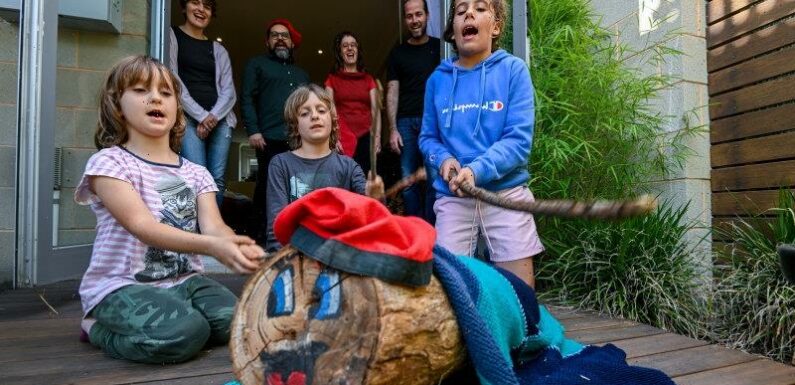
The great Australian Christmas follows a familiar routine for many families. But for some, their festive tradition involves KFC for Christmas dinner, a talking log that “poos” presents or a performance in exchange for a gift.
Ramon Castro, and Màrius and Julieta Miralles hit the Tió de Nadal.Credit:Joe Armao
Some families are continuing their own unique traditions over the festive season, keeping their culture alive and connecting them with the practices of their home countries.
Here are three unconventional traditions you may not have heard of.
Tió de Nadal (also known as the pooping Christmas log)
A special tradition practiced in Catalonia, a region bordered by Spain, involves a log painted with a smiling human face. Children smack the log with sticks until it ‘defecates’ presents.
Melbourne’s Catalan Club president Daniel Castro moved to Australia 15 years ago, but his family has enjoyed keeping the Tió de Nadal tradition alive almost every year since.
“It’s not very politically correct having to hit someone so they give you presents, but that’s how we grew up,” he says.
There are many stories as to the origin of Tió de Nadal, including one that describes a talking log appearing in the chimney of a farmhouse in Catalonia, bringing the family good luck.
The log is kept warm in the cold European winter with blankets and ‘fed’ with small food items in the lead-up to Christmas Day.
With some assistance from parents, the log ‘consumes’ the offerings, until the time comes for the children to provoke the log to ‘poo’ out presents.
While a crowd pleaser, Castro said the tradition had an underlying message about the importance of nurturing the natural world for it to give back to you.
“It’s a really vivid way of keeping the traditions for us and maintaining our culture,” Castro says.
Kentucky Fried Christmas dinner
KFC for Christmas dinner might sound unconventional, but a successful marketing campaign by the fast food giant in 1974 resulted in the fried finger food becoming a Christmas staple for many families in Japan.
University student Midori Hong says she still remembers the familiar jingle of the KFC ads from her childhood in Sapporo, in northern Japan.
Yumiko Hong, with her daughters, Himiko Hong, Midori Hong and Ranko Hong, will be eating KFC this Christmas.Credit:Joe Armao
“For the last seven years out of the 13 years we were in Japan, we had KFC Christmas dinners. It became a little Christmas tradition,” she says.
Continuing this tradition was challenging when Hong and her family moved to Melbourne last year, as most KFC stores were shut on December 25.
Hong said the practice made her feel connected to Japanese culture, although the KFC “tastes better in Japan”.
“My younger sister, she’s 12, we don’t want her to forget all the things we did in Japan,” Hong says.
‘You don’t get a present for nothing’
Under Estonian tradition children, and sometimes adults, need to offer a performance in exchange for their gift on Christmas Day because, as cafe owner Evelin Erm says, “you are not going to get the present for nothing”.
Erm says she enjoys continuing her traditions in Melbourne, even though the weather is starkly different to her hometown of Pärnu in southern Estonia.
Pork, potatoes, sauerkraut and gingerbread are all on the menu for “breakfast, lunch, and dinner,” and a plate is left out for deceased relatives overnight on Christmas Eve.
Estonian children are wary to behave well over the Christmas season. Under the watchful eye of elves roaming the street, good behaviour is rewarded with treats left in their slippers overnight.
A trip to the sauna is commonplace for Estonians on Christmas Eve, as families believe they must be clean for dinner or church services the next day.
“Not only your home, but your body is super clean,” Erm says. “You get ready put nice clothes on, and have a nice dinner.”
With Marta Pascual Juanola
The Morning Edition newsletter is our guide to the day’s most important and interesting stories, analysis and insights. Sign up here.
Most Viewed in National
From our partners
Source: Read Full Article

